| Reviews & Columns |
|
Reviews DVD TV on DVD Blu-ray 4K UHD International DVDs In Theaters Reviews by Studio Video Games Features Collector Series DVDs Easter Egg Database Interviews DVD Talk Radio Feature Articles Columns Anime Talk DVD Savant Horror DVDs The M.O.D. Squad Art House HD Talk Silent DVD
|
DVD Talk Forum |
|
|
| Resources |
|
DVD Price Search Customer Service #'s RCE Info Links |
|
Columns
|
|
|
Autumn Sonata: The Criterion Collection
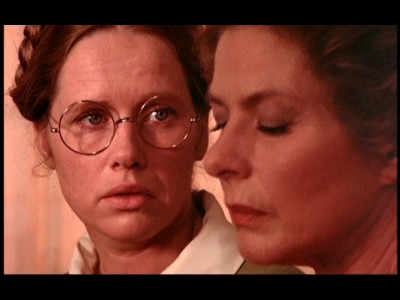
Please Note: The images used here are taken from the standard-definition 1999 DVD version of the film, not the Blu-ray edition under review.
The Ingmar Bergman Close-Up is one of the treasures of the cinema -- an stylistic signature so inspired and honed and skillfully conjured/rationed that there's no way it should appear so simple onscreen as it devastates us, brings us uncomfortably close to a character's emotion. When Bergman fills the screen with his actress' faces (and it is, more often than not, an actress; he had a way with women, with women's stories), it's not a glamor shot, not that kind of beauty. These too-close framings, minutely lit and composed and as stark and suggestive as landscapes, are the director using the camera as spiritual radiography, x-rays of the human soul. There's an innate tension and suspense to the investigation Bergman's conducting in such an intent, sustained manner: Will the finding of this penetrating gaze be a human vulnerability, anguish, or compassion (Ingrid Thulin in Winter Light)? Or will it be -- soberingly, just as recognizable -- an unvarnished, unmitigated cruelty or contempt (Liv Ullmann in Cries and Whispers or Persona)? Bergman's great filmography is replete with his singular perfection of one of the cinema's most basic building blocks (the intellectually well-formed Swede was apparently in full accord with the John Ford -- a filmmaker otherwise worlds away in theme, style, and sensibility -- who said, when weather prohibited wide exterior shots, "What can we shoot? The most interesting, exciting thing in the world, the human face.") but Autumn Sonata, the film he made in 1978, his last theatrical feature with his perennial muse Liv Ullmann (she would return for Bergman's 2004 Swedish-television swan song, the wonderful Saraband) and his first and only with international screen legend Ingrid Bergman, is a pared-down chamber drama that hangs to an even further extent than usual from the carefully shot, emotionally porous visages of its unforgettable leads.
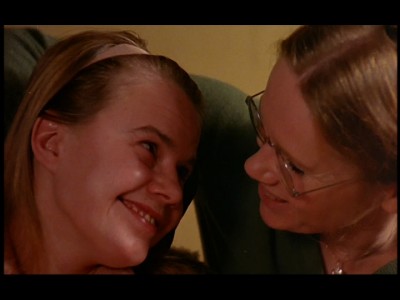
This time, Ullmann gets to be the generally vulnerable one, while the cruelest gaze is reserved for Ingrid Bergman. Ullmann is Eva, the sweet but sad, insecure, and nebbishy wife of a pastor (Halvar Bjork) who lives with him in their parsonage in rural Norway, along with her living memory of her Viktor's little boy, who drowned when he was four, and her ill and developmentally disabled sister, Helena (Lena Nyman, I Am Curious (Yellow)), whom she's taken in and cares for. Bergman is Charlotte, a world-famous, acclaimed, and beloved concert pianist for whom, it becomes clear over the course of the film, motherhood -- especially of the emotionally very intelligent but sensitive, awkward Eva and the permanently infant-like Helena -- was an ambivalent, cumbersome proposition. Her look of proud, severe, uncontrollable contempt comes as she gazes on after she has pressured Eva into playing what she's been learning, Chopin's second piano prelude, which Charlotte can then only pretend not to want to come in and rescue from Eva's earnest but clumsy hands by playing it correctly, beautifully, and artistically, thereby roundly humiliating her eager-to-please daughter. After the death of a longtime boyfriend (not Eva's late father), Charlotte has come at Eva's invitation to stay for a few days with her and Viktor, after many years' distance and absence, and this vividly shaming impromptu piano recital is a hint of the real pattern, the sickness that has long eaten away at this parent-child bond despite the excitement and cheer with which we've initially seen mother and daughter reunited.
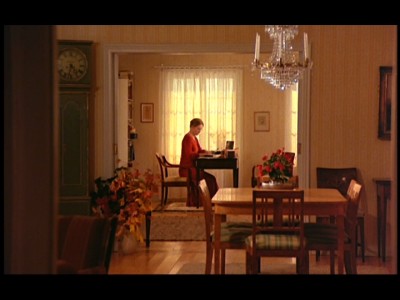
When Charlotte is awakened by a horrifying dream (Helena, her sick, abandoned, and guilt-inducing child, grasping for and smothering Charlotte as she sleeps) and Eva is experiencing insomnia after her mother's rankling passive-aggressive unkindness, their fraught states and some perhaps ill-advised or over-imbibed red wine bring on a confrontation -- Eva's near-hysterical blaming of her mother for the damaged, fearful, emotionally incapacitated woman she's become; Charlotte's horror, always, at the prospect of being dragged down from her great worldly/artistic heights by her prosaic, unglamorous daughters -- that is unbelievably extended and virtuosically held, moment by moment, by everyone involved: Bergman and cinematographer Sven Nykvist behind the camera, and Ullmann and the other Bergman onscreen, living through the real-time ebbs and flows of Charlotte's and Eva's never-forgotten wounds, accusations, defensiveness, and exquisitely painful emotional nakedness, their impasse of strong, hidden, incompatible feeling. Those close-ups -- of Ullmann's half-admiring, half-eclipsed face shot frontally, framed by Bergman's profile as Charlotte effortlessly, ruthlessly shows up Eva's feeble stab at Chopin; Ullmann's tear-stained face, candlelit and twisted by fury during mother's and daughter's jointly experienced dark night of the soul; the final shot of Bergman looking at us straight on, a haplessly strong, ego-blessed animal in the headlights of a damage she never intended or gave much thought to -- are the most forceful reprises of this complex, progressively deepening emotional melody, Bergman's small-scale but full-bodied duet for his two players, actresses whose instruments (their bodies, their voices, above all their faces) he allows, encourages, or cajoles (Ingrid Bergman, as revealed in the disc's extras, was a handful and had to have her theatrical/Hollywood impulses reined in for Bergman's more intimate purposes) them to make the most fine, supple use of.
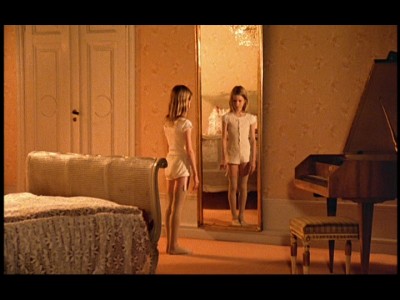
Of course, no good piece of music could live solely by its most immediately memorable interludes, and no dramatic/narrative feature film could get by with only close-ups, the power of which comes from context and timing; though his unflinching gaze into actors' faces is, perhaps here more than ever, Bergman's definitively recognizable and unforgettable characteristic, the visual sensuality with which he creates his cinematic worlds (often in collaboration with his invaluable lighting cameraman, Sven Nykvist, a great artist in his own right) is given full, ravishing voice in Autumn Sonata, too: If its title suggests something composed by its creator in his autumn years (and Autumn Sonata was, indeed, Bergman's penultimate theatrical film before he "retired" from the cinema with Fanny and Alexander in 1982), it has a more literal, tangible referent in the gold, orange, and red that glow, in their slightly heightened, subtly artificial ways, through this story that takes place, aptly enough, in the season when nature's beauty becomes most rapturously vivid before it slowly fades away. (Bergman and Nykvist add yet a further visual dimension, going even more artificial and boldly colorful, dreamlike, for the film's very quick, quiet, pendant-like flashbacks to Charlotte tending to her dying lover in the hospital, and to Eva's well-appointed but stifled, neglected childhood and adolescence.) There's a sense in which Autumn Sonata is a "small" film, with its exceptionally brief span of plot-time and tight, isolating focus on a very small number of characters. But with Bergman's so multifariously treating our eyes, minds, and intelligences, parlaying his serious, profound expertise in matters of human emotion and his insistence on a purely concentrated, becalmed yet powerfully assured visual beauty into such impossibly lovely, moving story-images, it feels like something extraordinarily large in all of the most important ways, adding cinematic pleasure upon pleasure until it brims over, a bountiful emotional galvanization of the particularly draining, cleansing variety that belongs to Bergman alone.
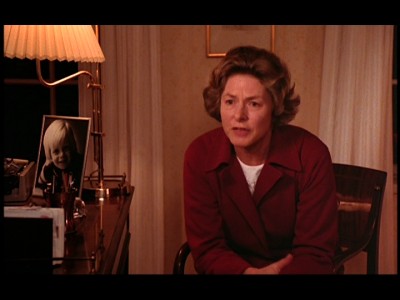
Video:
This transfer, made from the Swedish Film Institute's 2010 2K digital restoration, is pretty much perfect, certainly a vast and glorious improvement upon the 1999 DVD release. Nykvist's inimitable way with color and light -- the red of Bergman's costume and the green of Ullmann's; the autumnal glow of the mise-en-scène, that season's colors and shadings in the exteriors and the subtly variegated shadow and light of nighttime interiors -- looks as magnificent as it should here. There are rock-solid darks/blacks, natural skin tones, not one instance of aliasing or edge enhancement, and a faithful preservation of celluloid-like grain/texture, with no over-application of DNR to rob the film of any of its cinematic aura. What you get when you watch Autumn Sonata this way is nothing short of top-notch, gold-standard picture quality.
Sound:The PCM 1.0 uncompressed monaural sound track (in Swedish with optional subtitles, along with a for-historical-purposes-only English-dubbed track) preserves the film's original mono sound with beautiful clarity and richness. The dialogue is immediate and vividly present, the glorious snatches of music are crystalline, pure, and robust, and there's not a single moment of distortion, imbalance, or any other audio flaw.
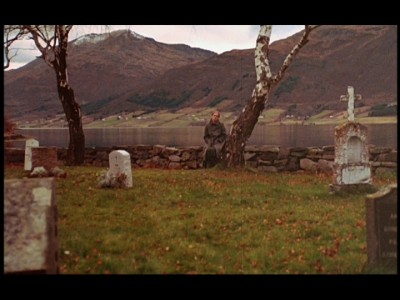
Complementarily to the very significant and laudable upgrade in picture quality for this new edition, Criterion has hugely expanded and improved upon the bare-bones supplements that were included on their 1999 DVD release of Autumn Sonata. This really is an entirely revamped, wholly improved package, with the only extra from the old edition, Peter Cowie's "audio essay" (now dubbed a "commentary," though the initial "essay" was more appropriate for Cowie's knowledgeable and insightful but highly personal, subjective, and conversational approach), included here alongside a huge bounty of newly incorporated bonus material, including:
--A seven-minute introduction to the film by director Ingmar Bergman (actually taken, as most of these DVD/Blu-ray "introductions" are, from footage shot for Swedish Television in 2003 for what would become Marie Nyrerod's 2006 documentary feature Bergman Island) in which he tells a story almost as terrifying and beautiful as the one in the feature: That of taming the terminally cancer-ridden Ingrid Bergman's initial overacting into something he could use. He tenderly recounts the way in which he, Ullmann, and Bergman came to work together on this picture; his and Bergman's clashes at the beginning; and their ultimately lively but harmonious (and, he considers and I would agree, very successful) collaboration.
--"Ingrid Bergman at the NFT" (40 min.), a 1981 interview at England's National Film Theatre facilitated by the Guardian newspaper, in which Bergman, led by a smart, succinct interviewer and a brief audience Q&A, covers her whole career, from Hollywood to Rossellini/Italy to Jean Renoir to Bergman and Autumn Sonata. It's a treat to experience this grande dame of the cinema, cheerful yet inevitably imposing, reminisce, with her self-deprecating mix of honesty and generosity, on her long involvement in the medium. (Hearing her talk about the Italian phase of her work will surely whet one's appetite for Criterion's highly anticipated 3 Films by Roberto Rossellini Starring Ingrid Bergman set, too.)
--"Liv Ullmann on Autumn Sonata" (20 min.), a new interview with the great Ullmann (who, at this point, has all the well-earned legend and elder-stateswoman status of Bergman at the time of the aforementioned '81 piece) who, as a perhaps more objective participant/observer of the Ingmar/Ingrid tete-a-tete, sees it as a never-reconciled but very fruitful creative conflict (both Bergmans' spins, in their respective interviews, are much warmer and fuzzier). A wise, accomplished, graceful class act, Ullmann manages to disclose the clashes on the Autumn Sonata set in such a way that she doesn't for a second sound like she's gossiping or criticizing, and she brims with equal admiration for the genius filmmaker and the strong, stubborn actress who dared question him.
--The biggest deal by far of all of these excellent bonus features is The Making of Autumn Sonata, a 3-1/2-hour (!) verite-style behind-the-scenes making-of (shot by set stills photographer Arne Carlsson) that documents, in day-by-day chronological order, every step of the process: production meetings, table reads, rehearsals, screen tests, costuming and makeup, along with rare, precious footage of the shooting days themselves, with the shoot a surprisingly relaxed, sometimes even mirthful affair. For anyone who loves Bergman, either of his principal actors, or cinema in general, this incredibly intimate and expansive inside look at the creative process(es) involved is a remarkable gift.
--The film's original theatrical trailer.
--An elegantly designed 20-page booklet featuring a new essay on the film by critic Farran Smith Nehme.
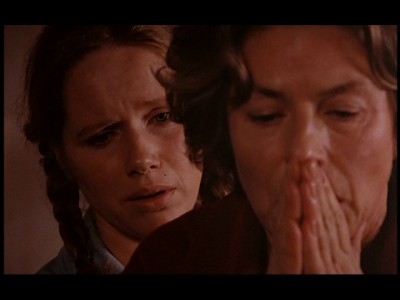
A lush yet bracing piece from one of the cinema's great maestros of frail, fraught human longing and (dis)connection, Autumn Sonata earns its bold musical title through its brilliant elaboration of the dissonant harmonies between an aging mother (Ingrid Bergman) and adult daughter (Liv Ullmann), reunited after a long separation, facing their day of emotional reckoning. It's not that the parental wounds obviously inflicted by the self-absorbed Charlotte (Bergman) or the too-long clung-to recriminations of the neurotic Eva (Ullmann) are that unusual, awful, or surprising, or fresh territory for drama/fiction; what makes Autumn Sonata so powerful is that Bergman's famously clear, supple sensitivity and intuition, on perfectly complementary and often exquisite visual and performative terms, for intimately, personally, physically felt emotion takes us far beneath what could've seemed, on the surface, common, even petty parent-child complaint. Bergman and his fine, fine actresses (petrifyingly baring their characters' hidden souls in a delicate world, so warmly melancholy in its slightly heightened autumnal colors, created between Bergman and cinematographer Sven Nykvist) have a rich, sharp understand of the idea that a mother and daughter can also be two individuals with legitimate, strong, unfortunately opposed needs, and how it feels from the inside to have those needs unmet, thwarted, dismissed, or revealed to be bottomless, irrational, but incurable hungers. Bergman has an acute ear for the music of these two unhappy souls, and the dramatist and director in him conduct them to an intensity that's almost unbearably affecting, then sustains it in a way that approaches the miraculous. With this new edition bringing us the picture in all its restored visual and aural splendor, Autumn Sonata, though previously available, proves to be one of the best-executed, most laudable re-releases of the year, a priority purchase for the devoted Bergman aficionado and the wider-ranging cinephile alike. Highly Recommended.
|
| Popular Reviews |
| Sponsored Links |
|
|
| Sponsored Links |
|
|
| Release List | Reviews | Shop | Newsletter | Forum | DVD Giveaways | Blu-Ray | Advertise |
|
Copyright 2024 DVDTalk.com All Rights Reserved. Legal Info, Privacy Policy, Terms of Use,
Manage Preferences,
Your Privacy Choices | |||||||












